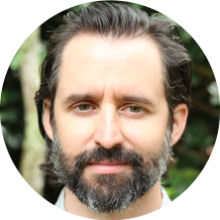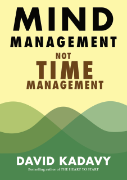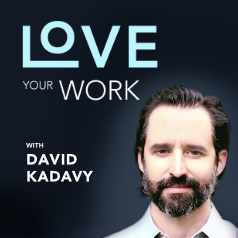Subscribe to blog updates via email »
The Books of the Decade
While the 00’s are being called a lost decade for the US economy, there’s no doubt that it was a decade of incredible changes in technology, communication, and the way we see the world. I’ve compiled a list of my favorite books that define a decade that was full of exciting changes for the world, as well as for myself. I have to admit that sometimes difficult to separate the enormous personal changes I experienced in this decade – which was a coming of age one for me – from those of the world. Fortunately, they aren’t mutually exclusive. So, here they are: the eight books that define the decade, in an order that seemed intuitive to me.
The Cluetrain Manifesto: The End of Business as Usual by Christopher Lock et. al.
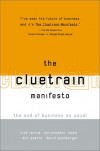 Written in 1999, and published in 2000, this book was an appropriate introduction to a world-changing decade. It’s a collection of “95 theses” explaining how authentic, global, person-to-person communication would transform the way businesses interact with their customers. Through e-mail, message boards, and blogs (implied though not mentioned), the power behind information distribution would soon be shifting from that of large corporations, to that of individuals – human beings. My favorite thesis: “Markets are Conversations.” This was an exciting book for me to read because it was clear this power shift could change much more than just how business and customers interacted – it was the signal that soon the truth would always be more clear.
Written in 1999, and published in 2000, this book was an appropriate introduction to a world-changing decade. It’s a collection of “95 theses” explaining how authentic, global, person-to-person communication would transform the way businesses interact with their customers. Through e-mail, message boards, and blogs (implied though not mentioned), the power behind information distribution would soon be shifting from that of large corporations, to that of individuals – human beings. My favorite thesis: “Markets are Conversations.” This was an exciting book for me to read because it was clear this power shift could change much more than just how business and customers interacted – it was the signal that soon the truth would always be more clear.
The Tipping Point: How Little Things Can Make a Big Difference by Malcolm Gladwell
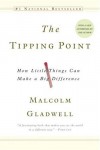 This 2000 book was another fitting introduction to a decade because it presented the phenomena that would be the champions of the decade. The “Connectors” and “Mavens” – through blogs, message boards, and social networking sites – would soon be seeing more power to expand their vast networks of acquaintences and validate their expertise; making them the most sought after customers in companies quests to make their products go “viral.” Of course, it would all really depend on the “Stickiness Factor” of said products. This book was important to me not only because it helped me understand how ideas spread, but I found Malcom Gladwell’s style of writing and packaging of concepts to be inspirational, and helpful to observe.
This 2000 book was another fitting introduction to a decade because it presented the phenomena that would be the champions of the decade. The “Connectors” and “Mavens” – through blogs, message boards, and social networking sites – would soon be seeing more power to expand their vast networks of acquaintences and validate their expertise; making them the most sought after customers in companies quests to make their products go “viral.” Of course, it would all really depend on the “Stickiness Factor” of said products. This book was important to me not only because it helped me understand how ideas spread, but I found Malcom Gladwell’s style of writing and packaging of concepts to be inspirational, and helpful to observe.
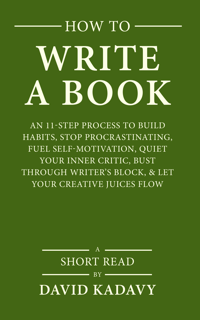
WANT TO WRITE A BOOK?
Download your FREE copy of How to Write a Book »
(for a limited time)
Getting Things Done: The Art of Stress-Free Productivity by David Allen
 With the amount of information a person encountered in a given day rising exponentially, a new way of working was needed. In 2002, David Allen published this book, outlining a system of how to route all of that stimuli into a system that allows one to prioritize, delegate, and DO all of the things that need to be done. It was followed with religious fervor, and the whole concept behind the book came to be known as “GTD.” This book spawned countless GTD-related blogs, software tools, and physical-world hacks such as The Hipster PDA Keychain. This was an important book for me because it responded to the pain that I – and I think everyone – felt with managing a tidal wave of information, and the now seemingly endless possibilities that each day presented. (Read my Getting Things Done book summary.)
With the amount of information a person encountered in a given day rising exponentially, a new way of working was needed. In 2002, David Allen published this book, outlining a system of how to route all of that stimuli into a system that allows one to prioritize, delegate, and DO all of the things that need to be done. It was followed with religious fervor, and the whole concept behind the book came to be known as “GTD.” This book spawned countless GTD-related blogs, software tools, and physical-world hacks such as The Hipster PDA Keychain. This was an important book for me because it responded to the pain that I – and I think everyone – felt with managing a tidal wave of information, and the now seemingly endless possibilities that each day presented. (Read my Getting Things Done book summary.)
Four Hour Work Week: Escape 9-5, Live Anywhere, & Join the New Rich by Tim Ferriss
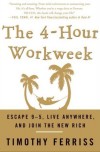 By virtue of our changed ways of accessing, interacting with, and managing information – the way we interacted with our physical world changed as well. With asynchronous communication techonologies such as e-mail and IM – now accessible from the palm of your hand, suddenly the whole concept of needing to be at a particular place at a particular time, just to make a living, started to look more antiquated. By use of the 80/20 rule, outsourcing, and running small tests with technologies like AdWords, Tim Ferriss’s 2007 book showed the world just how far one could stretch their potential. One can automate their income, freeing up time to pursue their passions, all while traveling the world. The bombastic title turned off many people; but I believe this book will stand as a marker in a revolutionary change in the way we work. This was an important book to me because it validated and made more clear just what it was about 9-5 that didn’t make any sense to me.
By virtue of our changed ways of accessing, interacting with, and managing information – the way we interacted with our physical world changed as well. With asynchronous communication techonologies such as e-mail and IM – now accessible from the palm of your hand, suddenly the whole concept of needing to be at a particular place at a particular time, just to make a living, started to look more antiquated. By use of the 80/20 rule, outsourcing, and running small tests with technologies like AdWords, Tim Ferriss’s 2007 book showed the world just how far one could stretch their potential. One can automate their income, freeing up time to pursue their passions, all while traveling the world. The bombastic title turned off many people; but I believe this book will stand as a marker in a revolutionary change in the way we work. This was an important book to me because it validated and made more clear just what it was about 9-5 that didn’t make any sense to me.
The Ultimate Question: Driving Good Profits & True Growth by Fred Reichheld
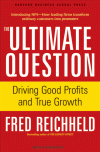 With a good portion of power now undeniably within the grip of the individual, organizations had to change the way they did business. This 2006 book outlined a concept, called Net Promoter Score, that has become a standard metric in today’s top organizations. By asking “The Ultimate Question” of your customers, “how likely are you to recommend X to a friend?” companies can now identify their “promoters” and “detractors,” and link a metric to a customer’s experience in any given interaction with their company. NPS leaders, such as Enterprise Rent-A-Car, innovate on customer experience from the bottom up – distributing ideas developed by the employees that have the closest contact with the customer. This was an important book for me because it was exciting to see how the internet had changed the way top companies viewed their customers.
With a good portion of power now undeniably within the grip of the individual, organizations had to change the way they did business. This 2006 book outlined a concept, called Net Promoter Score, that has become a standard metric in today’s top organizations. By asking “The Ultimate Question” of your customers, “how likely are you to recommend X to a friend?” companies can now identify their “promoters” and “detractors,” and link a metric to a customer’s experience in any given interaction with their company. NPS leaders, such as Enterprise Rent-A-Car, innovate on customer experience from the bottom up – distributing ideas developed by the employees that have the closest contact with the customer. This was an important book for me because it was exciting to see how the internet had changed the way top companies viewed their customers.
Cradle to Cradle: Remaking the Way We Make Things by William McDonough & Michael Braungart
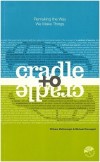 With most of the basic needs of the American middle class met, and easier and cheaper sharing of information, the environment was a hard issue to ignore. This 2002 book exposed not only the broken industrial system that was (and still is) harming our planet and our health, but the faults in our attempts to fix them (for example, recycling is really “downcycling” – degrading materials each time). Braungart and McDonough promote a Cradle to Cradle concept that employs waste-free systems that make optimal use of “technical nutrients” and “biological nutrients.” This was an important read to me not only because I found it to be practical and realistic approach to a cleaner and healthier environment; but it introduced me to thought frameworks that can be used in other areas to design an integrated lifestyle.
With most of the basic needs of the American middle class met, and easier and cheaper sharing of information, the environment was a hard issue to ignore. This 2002 book exposed not only the broken industrial system that was (and still is) harming our planet and our health, but the faults in our attempts to fix them (for example, recycling is really “downcycling” – degrading materials each time). Braungart and McDonough promote a Cradle to Cradle concept that employs waste-free systems that make optimal use of “technical nutrients” and “biological nutrients.” This was an important read to me not only because I found it to be practical and realistic approach to a cleaner and healthier environment; but it introduced me to thought frameworks that can be used in other areas to design an integrated lifestyle.
The Omnivore’s Dilemma: A Natural History of Four Meals by Michael Pollan
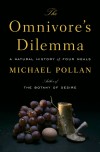 Yet another book whose popularity was made possible by a shift in power, The Omnivore’s Dilemma called in to question our relationship with one of the most essential – yet underconsidered – sources of life: the food we eat. While America owes much of its success to our access to cheap food, the side-effects are emerging. Food safety issues, obesity, diabetes, and a lack of transparency of where our food comes from are all products of industrial agriculture and public policy that is enmeshed with our apathy toward our relationship with food. In this 2006 book, Michael Pollan dissects the sources of our food to reveal a lack of biodiversity, cultural apathy, and a broken political system. Since publishing this book, Pollan has published In Defense of Food, and appeared in the movie Food, Inc. and concern for the source of our food has become a mainstream topic. This book was important to me because it opened my eyes to the link between what I eat, and how I feel.
Yet another book whose popularity was made possible by a shift in power, The Omnivore’s Dilemma called in to question our relationship with one of the most essential – yet underconsidered – sources of life: the food we eat. While America owes much of its success to our access to cheap food, the side-effects are emerging. Food safety issues, obesity, diabetes, and a lack of transparency of where our food comes from are all products of industrial agriculture and public policy that is enmeshed with our apathy toward our relationship with food. In this 2006 book, Michael Pollan dissects the sources of our food to reveal a lack of biodiversity, cultural apathy, and a broken political system. Since publishing this book, Pollan has published In Defense of Food, and appeared in the movie Food, Inc. and concern for the source of our food has become a mainstream topic. This book was important to me because it opened my eyes to the link between what I eat, and how I feel.
What is the What? by Dave Eggers
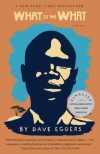 Through 9/11, the internet, and increased gobal travel, this decade brought us more awareness of the people with whom we share this world, and brought life to the inequities that were once nothing but news headlines. What is the What?, a 2006 novel written by Dave Eggers is a product and reflection of that. It follows the life of Sudanese refugee, Valentino Achak Deng from boyhood as his village is ransacked by the murahaleen, and as he walks through Sudan, Ethiopia, and Kenya, suffering and witnessing unbelievable horrors and losses. Accounts of his days in Africa are interspersed with stories of his subsequent struggles in America as a member of the Lost Boys of Sudan program. This book was important to me because the accounts of Deng’s experiences were a conduit through which to understand the suffering that exists in the world. It was humbling to read, and made me not only appreciate my life; but it reinforced my belief that we rarely have as much to lose as we think we do.
Through 9/11, the internet, and increased gobal travel, this decade brought us more awareness of the people with whom we share this world, and brought life to the inequities that were once nothing but news headlines. What is the What?, a 2006 novel written by Dave Eggers is a product and reflection of that. It follows the life of Sudanese refugee, Valentino Achak Deng from boyhood as his village is ransacked by the murahaleen, and as he walks through Sudan, Ethiopia, and Kenya, suffering and witnessing unbelievable horrors and losses. Accounts of his days in Africa are interspersed with stories of his subsequent struggles in America as a member of the Lost Boys of Sudan program. This book was important to me because the accounts of Deng’s experiences were a conduit through which to understand the suffering that exists in the world. It was humbling to read, and made me not only appreciate my life; but it reinforced my belief that we rarely have as much to lose as we think we do.
I think the 00’s will be remembered as a decade when everything we take for granted about how we live our lives was called into question. The models for how we access, understand, and distribute information were violently disrupted, exposing the now obsolete frameworks within which we live our lives. In the 10’s we will rebuild those frameworks.
I’m looking forward to rebuilding with you in the 10’s.
